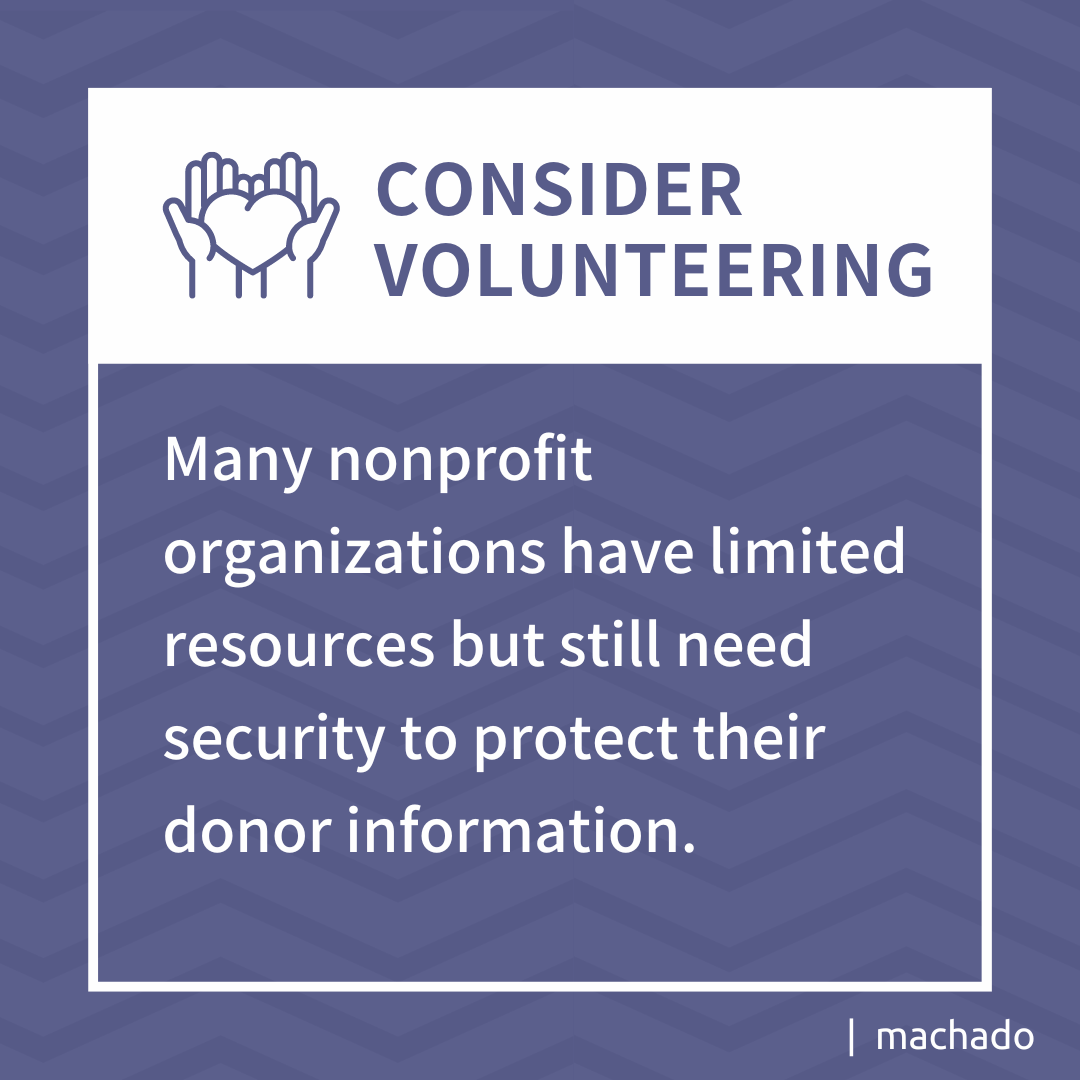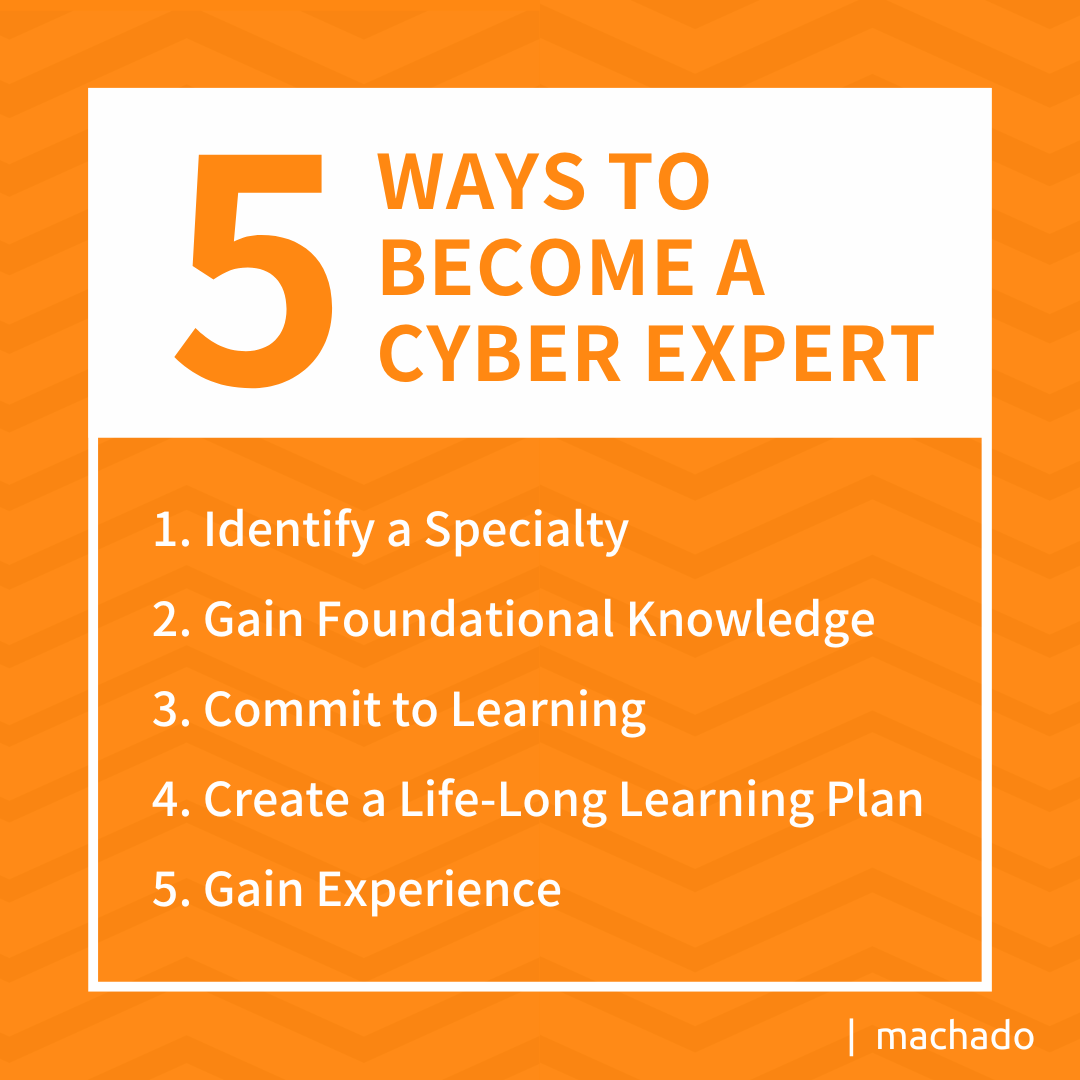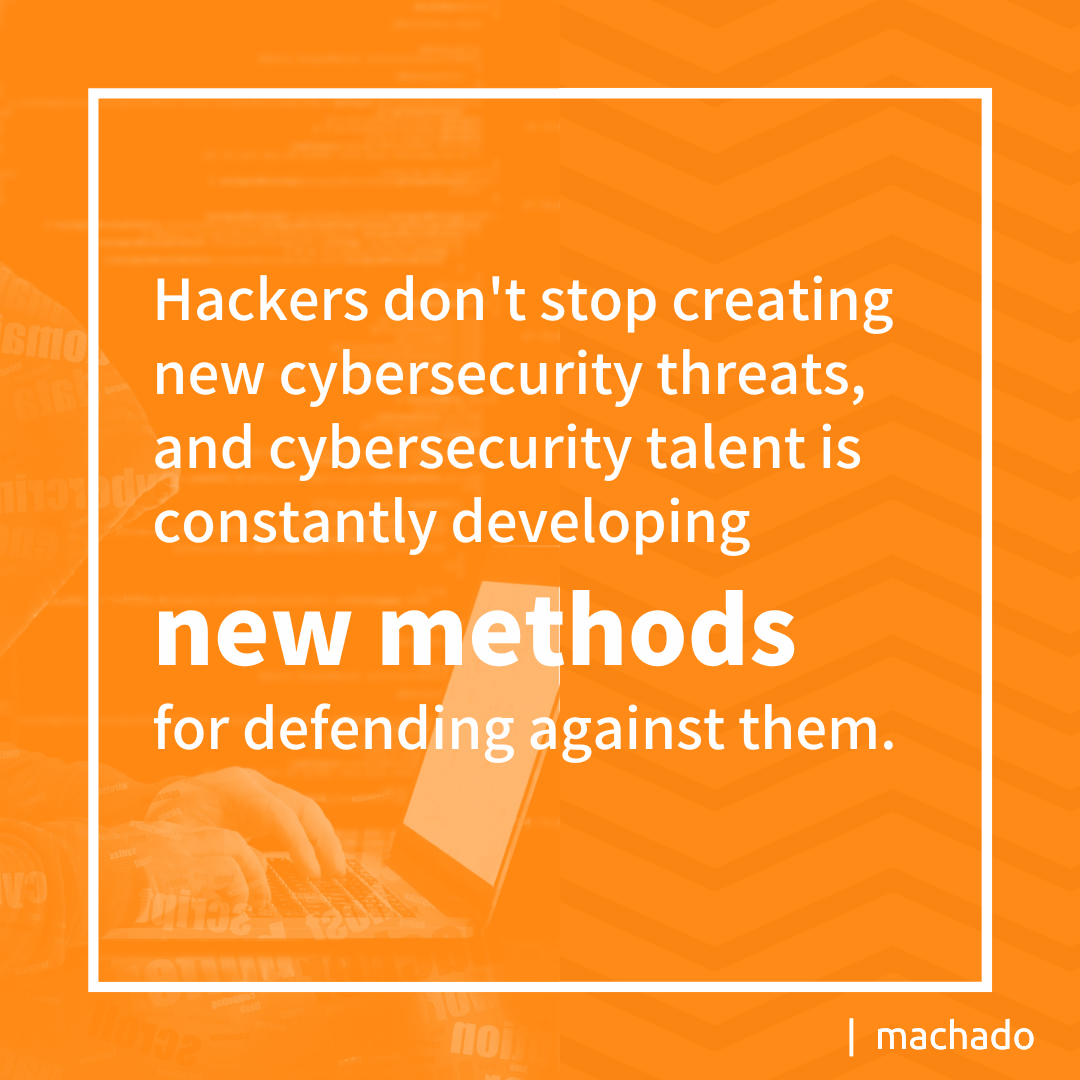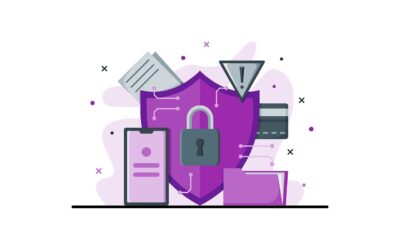If you’ve been looking for a cybersecurity professional with a deep level of expertise to support your business, you’re probably seeing first-hand they are hard to find. According to the US Bureau of Labor Statistics (BLS), there were 141,200 unfilled security positions in 2020, with a projected role vacancy of over 200,000 by 2030. You may be wondering what’s causing this talent shortage and asking yourself, “Is cybersecurity hard to learn?” as you consider other options to support your business. Perhaps you’re considering taking on some of this responsibility yourself or adding cyber-related tasks to an existing staff member’s current role.
Whether you’re looking to fill a cybersecurity role on your team or are looking to take on this role yourself through a non-traditional learning path, let’s review the answer to the big question — Is cybersecurity hard to learn? Honestly, it can be, but a lot depends on you. Do you know what areas of cybersecurity you need covered for your business? Are you willing to make the commitment to complete a detailed course of study?  Before starting on a cybersecurity training track yourself, you may need to acquire some fundamental skills depending on your background. That’s added time which may cost more and lengthen the time needed to complete your training. Are you ready to make that commitment? You should also know the key traits associated with cybersecurity talent. These include hard skills like education and certifications, as well as soft skills like communications.
Before starting on a cybersecurity training track yourself, you may need to acquire some fundamental skills depending on your background. That’s added time which may cost more and lengthen the time needed to complete your training. Are you ready to make that commitment? You should also know the key traits associated with cybersecurity talent. These include hard skills like education and certifications, as well as soft skills like communications.
The following steps can help you decide if taking on a cybersecurity role or responsibility is for you. Or, if it would be more cost-effective from a time and money perspective to hire talent, either to join your team as an employee or as a consultant.
5 Ways to Become a Cyber Expert
1. Identify a Specialty
A cyber expert should have a fundamental understanding of all types of cybersecurity, but to be successful, individuals should select a specialty. The field has become so large that a single individual can’t maintain expertise in all areas. With continuous changes in the field, it only makes sense to focus on one or two of the following areas:
Access Control
Access Control Systems and Methodology is concerned with establishing adequate access control restrictions to protect systems, data, infrastructure, and people. Individuals in this area design, develop, enforce, and maintain access control to ensure a system’s integrity, confidentiality, and availability.
Telecommunications and Networks
Anyone specializing in telecommunications and network security understands data communications in various environments such as LANs and WANs and remote access. Individuals know how to configure internet, extranet, and intranet infrastructures to protect digital assets. They should be familiar with hardware such as switches and routers, as well as protocols.
Security Management
Individuals involved in security management focus on service interruptions, whether those are natural disasters, system failures, or cyberattacks. They focus on protecting assets by developing and implementing policies to mitigate risk. They ensure that the procedures are maintained and mature as the organization grows.
Security Architecture
Experts in security architecture define how operating procedures and processes should be carried out to prevent and mitigate security compromises. Individuals in this domain determine the framework that an organization follows when setting up its infrastructure. Just like a network architect configures network components for maximum performance, a security architecture builds a structure for maximum security.
Law and Ethics
Cyber law and ethics work to define and enforce best practices for user behavior. Whether the user is an individual who participates in cyberbullying or nation-states that launch cyberattacks against foreign countries, this area of cybersecurity continues to grow. Specialists in this area are familiar with government and industry security standards as well as compliance issues. Good examples of this include CMMC and Cyber-Insurance compliance. A focus on law and ethics ensures organizations have policies in place to check ethical behavior among the users of their systems.
Application and System Development
More organizations are adopting the security by design approach to software development. With this approach, cybersecurity specialists work with developers to minimize the number of zero-day vulnerabilities. They also help with the design of applications to minimize the security burden on the end-user.
Cryptography
People wanting to specialize in cryptography learn how encryption works and which methods are best for a given application. They can work with developers, data administrators, and other IT staff to deploy encryption across an enterprise.
Computer Operations
Cybersecurity that centers around computer operations is responsible for what happens while an organization’s system is in use. Is there suspicious behavior? Is performance degrading? All of these are indications of a possible attack, and it’s a cybersecurity expert’s responsibility to prevent, detect, and contain activities that could result in a system compromise.
Physical Security
Not all cyberattacks begin in cyberspace. Sometimes, internal attacks begin by copying files from a server or loading malicious software onto a computer. Restricting physical access can prevent unauthorized personnel from getting to a device. Making sure that hardware is properly configured to minimize vulnerabilities is also part of maintaining physical security against cyberattacks.
2. Gain Foundational Knowledge
Before pursuing a cybersecurity career, you will need some fundamental knowledge of computer hardware, networks, software, and data management. Specifically, you should consider the following:
Software Skills. Cybersecurity experts should be comfortable using antivirus solutions that come standard with many operating systems. With some exposure to basic coding or scripting languages, you gain an understanding of how development works. You are also exposed to development tools that help in environments where programming is part of the position.
Hardware Skills. Cybersecurity is closely tied to network and system hardware. It’s important to know what hardware is available and which manufacturers offer the best protection for specific installations. Specialists should be comfortable with switches, firewalls, and routers to help network and system engineers with security.
Data Management. Cybersecurity is about protecting digital assets or data. Effective cybersecurity specialists understand basic data types and classes. They are familiar with data management to know when to call an expert for assistance.
Networking. As with hardware skills, networking capabilities are needed to understand how the different components make up a network. You will need a basic understanding of telecommunications, cloud operations, and LANs or WANs.
Cybersecurity Law. Security and compliance regulations are continuously changing as the landscape evolves. Knowing where to find the latest information is essential to staying on top of trends.
Ethical hacking. Tools are available for ethical hacking, and you should be familiar with the most common such as Wireshark and Nmap. Investigate hacking techniques so you are prepared to help with traffic sniffing or session spoofing.
Besides cybersecurity-specific skills, anyone wanting to move into the field needs soft skills such as communications, collaboration, and critical thinking.
If you want to stand out from the competition, do not ignore the value of soft skills. Companies see more value in a cybersecurity expert who can communicate than one who may have a Ph.D. but cannot collaborate with other team members.
3. Commit to Learning
Whether you take a formal or DIY path to become a cybersecurity expert, you must commit to the process. That commitment may be the hardest part because there are plenty of distractions that derail good intentions.
Recognize the Challenges
If you are doing this on your own, you may not have access to all the needed equipment. Rather than become frustrated at the limitation, take some time before you get too far into a program to investigate alternatives. If equipment access is not available, it doesn’t mean you can’t learn. You’ll just have to be creative in how you acquire the necessary skills.
You may not have a mentor. If you are lucky enough to know someone in the field who is willing to mentor, take them up on the offer. A mentor provides a resource when you run into a learning obstacle. Without some outside help, it may take you longer to get over a hurdle, but you will get there.
There’s no plan of study. Traditional programs have a list of courses in a specific order to help students learn. With DIY programs, you have the responsibility for determining a course of study. You will also need to determine the order of study. Studying topics out of order can lead to frustration, so take the time to set a well-designed program.
Create the Program
Decide which area of cybersecurity you want to pursue and research the types of courses needed. Online searches can reveal curriculum ideas that can form the basis for your program. They can also provide structure because of the order the courses are listed. Most colleges and universities have online catalogs that let you browse their programs.
Once you have a list of topics, search for ways to learn. There may be mini-courses, webinars, or bootcamps. Sometimes you can find great DIY textbooks. However, make sure they are current publications and from reputable sources. Local libraries or college campuses may have resources to help you select the best learning sources for a specific topic.
Get Started
Committing to a DIY cybersecurity effort means setting a schedule, turning off the TV, and getting as much experience as possible. If you’re taking an online course or bootcamp, you’ll have a structure, but for those topics where it’s just you and a book or website, you need to maintain a similar schedule. One hour a day for “class time” and two to three hours of “study time” each week. Stay focused.
4. Create a Life-Long Learning Plan
Being a cybersecurity expert requires continuous learning. Hackers don’t stop creating new cybersecurity threats, and cybersecurity talent is constantly developing new methods for defending against them. If you want to be a proactive cyber expert, you need an ongoing learning plan. There are multiple ways to stay on top of your area of expertise. Some include:
- Join user groups: Many organizations sponsor user groups or forums that can encourage conversations on current trends and concerns.
- Enter competitions: Experience is essential to prove to recruiters and employers that you can apply your knowledge to real-world situations. Entering cybersecurity contests is one way to gain experience and feedback.
- Attend conferences: There are hundreds of conferences, including virtual ones, that focus on different segments of the cybersecurity industry.
- Acquire added certifications: Certifications are always available for different cybersecurity specialties such as CompTIA Security+, Network+ or CSA+. With the number of possible certifications, be sure to assess which ones are the most applicable to your field of interest.
Depending on your area of interest, online courses offered by colleges and universities are another avenue for ongoing education.
5. Gain Experience
Experience is an essential part of a cybersecurity role and career. Look for opportunities to intern or apply for apprenticeships. Some organizations provide employees with in-house internships to help hone their skills. Consider volunteering. Many nonprofit organizations have limited resources but still need security to protect their donor information. 
Contact us today to learn about the benefits of working with a trusted cybersecurity partner.
With that in mind, you might consider collaborating with a managed services provider (MSP) who understands that aptitude and attitude play a significant role in the making of a cyber expert. With an experienced and certified partner overseeing your cybersecurity needs, you can still learn about the field yourself, as well as provide your employees with opportunities to work with seasoned professionals to further their own development goals. All of this can happen while you take comfort in knowing that your cybersecurity needs are being covered by experts in the field.







